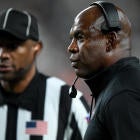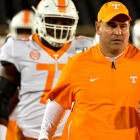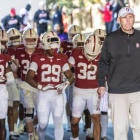There were few winners this week when Mel Tucker bolted Colorado for Michigan State after only one season. The move was simply hard to justify for most everyone … except for the coach and his agent.
A national discussion was started again on several levels. Meanwhile, the high road took a holiday. Almost no one looks good. Here's why:
Coaches can no longer question their players' loyalty. Especially not now after Tucker not only left Colorado after a season but did so four days after tweeting that he was "committed" to CU.
While I am flattered to be considered for the HC job @MSU_football, I am committed to @CUBuffsFootball for #TheBuild of our program, its great athletes, coaches & supporters. #UnfinishedBusiness #GoBuffs
— Mel Tucker (@Coach_mtucker) February 8, 2020
We are #Relentless #Culture #TheBuild
Critics predictably lit Tucker up on social media for his hypocrisy.
Can’t believe this.. crazy how promises can just be thrown away for some 💰 https://t.co/MJENYDH4s2
— ⚡️Joe Davis (@joshia_davis7) February 12, 2020
MEL TUCKER IS A CON MAN! He recruited my grandson to go to CU said he wasn’t going anywhere then ups and leaves. Sat there and lied to my face he wasn’t going anywhere!
— Drew Pearson (@88DrewPearson) February 12, 2020
So I want to beat him up today on social media.
What else can I do?
The amount of people Mel Tucker personally lied to even today, whew.
— Benjamin Allbright (@AllbrightNFL) February 12, 2020
Glad he secured the bag and hope that job works out, because his personal reputation took a hit today.
What makes the departure doubly insulting for Colorado: Tucker in October had, in fact, played the loyalty card.
"There is no transfer portal in the real world," he said.
Well, unless a coach transfers to Michigan State in order to double his salary.
In one sense, good for Tucker. We'd all take $5.4 million a year in a second. But please, coaches, stop lecturing us about the loyalty owed by players.
Oklahoma State's Mike Gundy recently reacted to the Big Ten's proposal for across-the-board one-time transfers this way: "The NFL doesn't have unrestricted, anytime free agency. None of the pro sports do. Those athletes have to fulfill their contract. What we have with our student-athletes is a four-year contract. It is what we sign and they sign when they are recruited."
Players sign contracts? Whoa. And I always thought it was a scholarship to receive a free education while playing sports.
Again, if Tucker hadn't recommitted to the Buffaloes four days before leaving, some of this would be digestible. Now? A lot of us just threw up in our mouths a little.
The clear unintended consequences of the early signing period. Colorado is now the seventh school to change coaches since prospects were able to sign with colleges early from Dec. 18-20, 2019. Both CU and Michigan State are essentially changing coaches after two signing periods as National Signing Day occurred on Feb. 5 and the period itself extends until April 1. Colorado is doing so by necessity, Michigan State by choice.
Am I the only who thinks all of those recruits who signed deserve to be let out of their scholarships? They not only signed with a coach -- despite the National Letter of Intent saying they signed with the school -- but did so within days of that coach leaving.
This sort of unfairness is what SEC commissioner Greg Sankey pointed out during the early signing period discussion. An estimated 150 recruits have been impacted by those seven coaching changes.
"It seems like we haven't changed behaviors, we just changed the timeline," Sankey told CBS Sports.
A couple of years ago, the Big 12 proposed that all athletes be allowed to transfer if their coach leaves or is fired.
"My son, it's the No. 1 reason he went to Iowa State over Stanford and Oregon, is because of the coach," Iowa State athletic director Jamie Pollard said. "If that coach left, I felt like he should have the opportunity to consider going somewhere else."
Thomas Pollard ran cross country with the Cyclones.
Tucker has the right to pursue a better job for more money. The players he recruited deserve the same freedom.
The coaching cascade lasted two additional months. The post-signing period movement alone caused an uneasy cascading of backfill on the part of schools scrambling to find replacements. Consider this scenario involving three schools in a 10-day period last month:
- Mississippi State fired Joe Moorhead on Jan. 3.
- Mike Leach left Washington State to take the MSU job on Jan. 9.
- Nick Rolovich left Hawaii for Washington State on Jan. 13.
The carousel stopped for a moment when Hawaii replaced Rolovich with the out-of-work Todd Graham on Feb. 1.
All of it was preceded by Matt Rhule leaving Baylor for the NFL's Carolina Panthers on Jan. 7 and Rocky Long resigning at San Diego State a day later. (Baylor replaced Ruhle with LSU defensive coordinator Dave Aranda. Defensive line coach Brady Hoke was elevated at SDSU for his second stint with the Aztecs.)
Never has there been this much upheaval in the short three-year history of the early signing period. For those 150 recruits, the uncertainty over what they've gotten into has to be spiking.
The Pac-12 is on the brink. Want to talk competitive imbalance? Michigan State basically bought out Tucker's promise to remain at Colorado. And it did so because it could. A Big Ten school flexed. A Pac-12 counterpart winced. It's as simple as that.
Colorado couldn't afford to keep Tucker the same way only a handful of Pac-12 schools -- if even that many -- could actually afford to hire Urban Meyer or a coach like him. That points up a larger issue for a conference that finds itself at a historic low point in its athletic history.
According to the latest figures, Pac-12 schools make at least $17 million less annually than their Big Ten counterparts in media revenue ($50 million vs. $33 million).
That matters. Big time. Jon Wilner of the San Jose Mercury News has already calculated that each Big Ten school will make $139 million more than its Pac-12 counterpart over the next five years.
So, of course Michigan State was able to make Tucker an offer he couldn't refuse. But it's not just Big Ten money. Tucker made $2.4 million at Colorado. Alabama's mere recruiting budget, according to a recent report, is $2.6 million.
The Pac-12's current competitive disadvantage with the rest of the Power Five is real, and the gap is growing wider.
- The league has had only elevated two playoff participants -- none in the last three seasons.
- Its Pac-12 Network has -- to be kind -- underachieved.
- UCLA is facing a massive $19 million athletic budget deficit.
- Pac-12 flagship program USC just finished with its lowest-ranked recruiting class in the history of the rankings. That opens up another discussion about Power Five schools reaching across the country to grab West Coast talent.
We are now at the point where the Pac-12 has to worry about its best coaching assets being stripped bare. With notable exceptions, Pac-12 schools simply aren't destination jobs.
Look at the recent numbers. In the last three offseasons, there have been nine Pac-12 coaching changes by eight schools. Only the SEC (four coaching changes in 2019) had a higher turnover ratio than the Pac-12 this season (three).
Let's stop the pearl clutching. There is much consternation from NCAA establishment types about an imbalance of power with the implementation of name, image and likeness rights.
It's already here. Eleven teams have occupied the 24 open spots in the six-year history of the College Football Playoff. Only four teams have won the CFP.
Whether you agree with players getting these rights or not, Alabama is going to continue to get the best players. The likes of Colorado are not.
Michigan State is paying a lot with no guarantees. Michigan State was desperate. It has always been a program that punched above its weight. Mark Dantonio had made a reputation coaching up three-stars, developing walk-ons and beating Michigan in eight of 13 meetings.
After the resignation of Dantonio, the Spartans had been turned down by Cincinnati's Luke Fickell with others like Pittsburgh's Pat Narduzzi publicly declining interest. That makes Tucker a second choice, at best, and one the Spartans absolutely had to land.
Before taking Colorado, Tucker was regarded as one of the best assistants in the country. His former bosses include Nick Saban, Kirby Smart and Jim Tressel. His resume includes 10 years as an NFL assistant, most as a defensive coordinator.
But we don't know what kind of head coach he'll be -- not yet, at least. For its $5.4 million, Michigan State is getting a coach who was 5-7 in his debut season at Colorado.
That $5.4 million puts Tucker right outside the top 10 highest-paid list, according to USA Today's coaching salaries database. He will make more than Northwestern's Pat Fitzgerald, largely considered to be one of the country's best coaches.
Fair? Nothing seems fair in college athletics these days. Michigan State had to overpay.
Now we'll wait for more ramifications.
![[object Object] Logo](https://sportshub.cbsistatic.com/i/2020/04/22/e9ceb731-8b3f-4c60-98fe-090ab66a2997/screen-shot-2020-04-22-at-11-04-56-am.png)

















